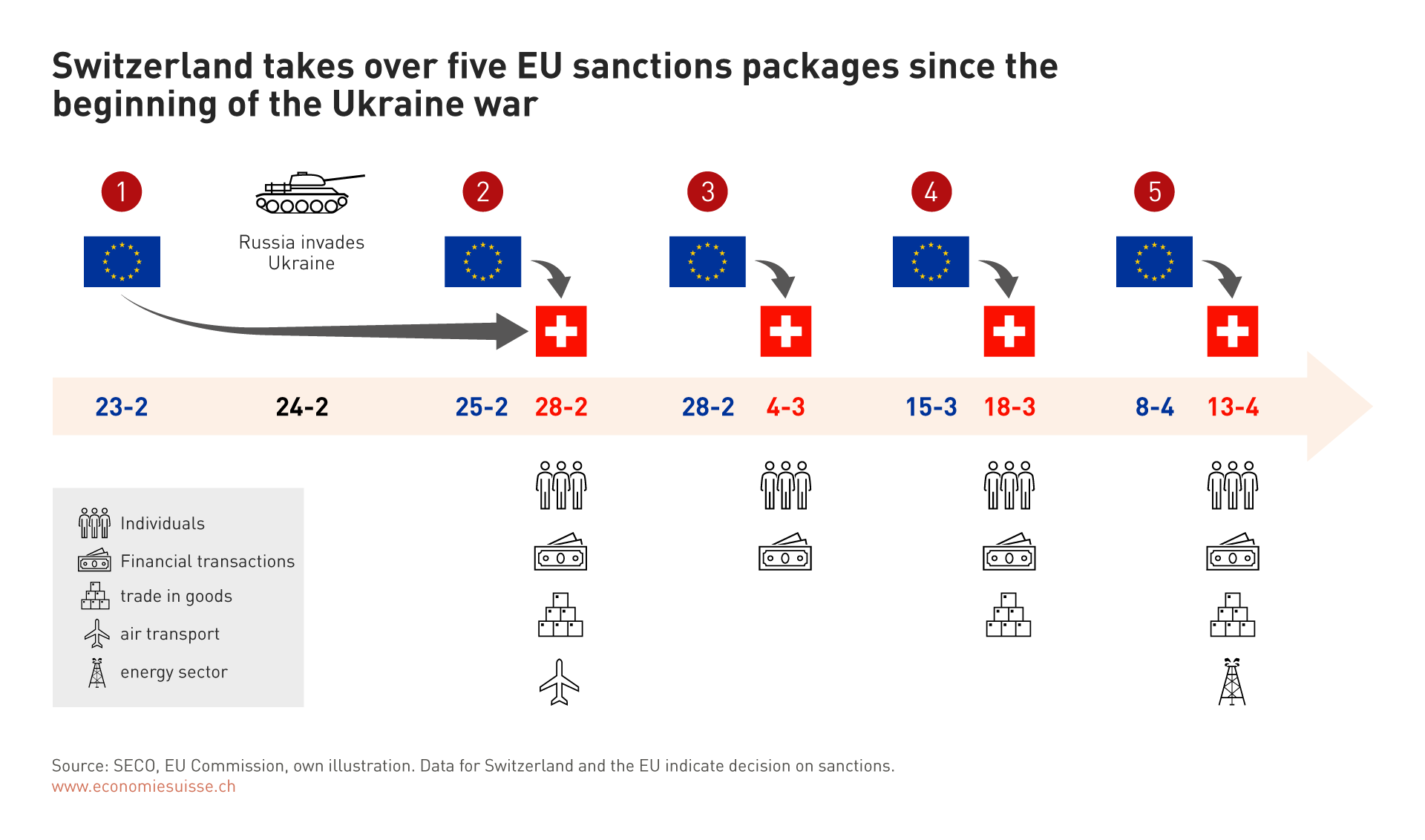The Swiss economy and the war in Ukraine – economic and humanitarian perspectives
- Introduction Executive summary | Positions of economiesuisse
- Chapter 1 The war in Ukraine also affects Switzerland
- Chapter 2 Economic impact
- Chapter 3 Swiss companies’ humanitarian engagement
- Chapter 4 Conclusion: Tragedy of war in Ukraine prioritises humanitarian aid
The war in Ukraine also affects Switzerland
Russia’s large-scale war of aggression against Ukraine since February 24, 2022, marks a historical turning point in Europe and beyond. The dramatic developments in the war in Ukraine over the past several months also have far-reaching consequences for Switzerland – from a humanitarian perspective as well as in terms of security and the economy. Swiss business leaders strongly condemn the war of aggression against Ukraine. Russia's blatant breach of international law is totally unacceptable.
On February 28, 2022, based on Article 1 of the Embargo Act, the Federal Council consequently decided to fully adopt the sanctions of the European Union (EU) against Russia (five sanctions packages to date). These also include measures against Belarus. The Swiss business community fully supports this decision. There is no question that Swiss companies comply with all the corresponding legal requirements. Independent sanctions by Switzerland, on the other hand, are not considered expedient.
Swiss sanctions against Russia and Belarus
Since February 28, 2022, the Federal Council decided to adopt all five of the EU's sanctions packages with a few exceptions such as transport bans, due to Switzerland's geographical location (e.g. maritime shipping). The measures focus on the following key aspects (status as of April 27, 2022):
- Airspace closed to all Russian aircraft
- Export bans (dual-use goods, aerospace goods, goods for the energy sector, paraffin, chemical and luxury goods)
- Import bans (weapons, ammunition and explosives, iron and steel products, coal, and other goods such as cement, wood, fertiliser, and caviar)
- Travel bans on individuals, asset freezes and prohibitions on providing economic resources and/or technical assistance to individuals and companies.
- Various financial measures: including prohibitions on transactions with the Russian Central Bank, prohibitions on granting loans, accepting deposits and, in connection with securities trading, prohibitions on providing financial resources to produce sanctioned goods, reporting requirements for blocked assets and existing deposits. Prohibitions on transactions with certain state-owned enterprises. Exclusion of major Russian banks from the SWIFT banking communications network.
- Prohibition of financial support to Russian public institutions (within the framework of a Swiss national programme) and prohibitions concerning trusts.
Switzerland has been very quick to adopt the successive EU sanctions packages. Additional sanctions are conceivable as the war in Ukraine continues. At the beginning of May 2022, the EU Commission presented a sixth sanctions package, which also includes a ban on the import of Russian oil. The State Secretariat for Economic Affairs (SECO) has set up a hotline for questions on sanctions and provides updated information online. In addition, a newsletter provides information on any changes to the sanctions.
Switzerland imposes the same sanctions as do important trading partners – such as the EU – against Russia and implements them quickly.

In response, Russia has taken various countermeasures against Western companies. These measures greatly increase the risks and uncertainties for Swiss companies doing business and investing in Russia.
Swift and decisive response by Swiss companies
Irrespective of the sanctions, Swiss companies have substantially reduced or completely suspended their economic activities in Russia and Belarus. The reaction of the business community thus in many cases goes well beyond what is required by the sanctions. Financial losses are of minor importance for the companies. For security reasons, they were also forced to reduce or temporarily suspend their activities in Ukraine. The safety of employees, the support of the suffering local population and sending a clear signal against the Russian war of aggression are the primary focus. As a result, many companies have been involved in the humanitarian sector since the very beginning of the war. They have been helping their employees, refugees, and the suffering population in the war zones.





